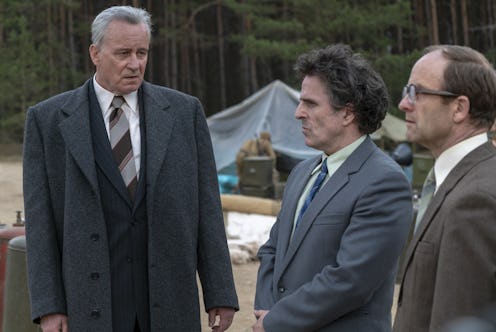Entertainment
As Seen On The HBO Series, Justice Wasn't Necessarily Served At The Chernobyl Trials

When natural disasters occur, politicians and other people in power may be to blame for failed preparation or response. But when human-made disasters occur, there's far more culpability to go around regarding the cause. And in the case of the 1986 nuclear power plant explosion at Chernobyl, some people did go to jail. During the finale of the HBO miniseries on June 3, you'll see the legal repercussions that some of the government officials and engineers faced. Because even though Chernobyl isn't 100 percent historically accurate, the Soviet Union held some people partially accountable for this deadly nuclear accident.
In Chernobyl, Emily Watson's Ulana Khomyuk has been investigating the cause of the disaster. While Ulana is not based on a real person, she is accurate that human error was partially responsible for the unit four reactor core explosion at the Chernobyl Nuclear Power Plant on April 26, 1986. But, as the miniseries has shown, who is to blame is more complicated since there were some political coverups occurring as well. New York Times science writer Henry Fountain outlined that Ulana acting as the truth seeker and moral compass is also a bit too simple for what really happened.
So when you combine these factors — plus, the rather confusing science — the ending of Chernobyl, just as it is in real life, will not be cut and dry.
However, as The New York Times reported on July 30, 1987, three men did face some clear consequences after a trial. Judge Raimond Brize sentenced plant director Viktor P. Bryukhanov (Con O'Neill), deputy chief engineer Anatoly S. Dyatlov (Paul Ritter), and chief engineer Nikolai M. Fomin (Adrian Rawlins) — pictured above — to 10 years in a labor camp for "gross violation of safety regulations." At least according to Chernobyl, Bryukhanov, Fomin, and Dyatlov rather belligerently ignored the very real evidence that the core had exploded. Instead, they seemed far more concerned with protecting their positions in power and directly put more people's lives in danger. And in real life, Bryukhanov was given an additional five years for abuse of power, which ran concurrently with his 10-year term.
Bryukhanov, Fomin, and Dyatlov weren't the only people to face imprisonment at a labor camp though. The New York Times reported that the shift chief of the number four reactor, Boris V. Rogozhkin, received five years for violating safety regulations, plus two concurrent years for negligence and unfaithful execution of duty. Senior engineer Yuri A. Laushkin received two years, also for negligence and unfaithful execution of duty. And the overall chief of the reactor, Aleksandr P. Kovalenko, received three years for violating safety regulations. At the time of their sentencing, the Chicago Tribune reported the official death toll due to Chernobyl was 31 people.
The Washington Post reported in 1992 that some of these convicted men were released early from the labor camps as "part of a general amnesty for Chernobyl officials." Dyatlov, who served half of his 10 years, told the American publication that he and the others were used as scapegoats. He claimed the real blame belonged to the designers of the reactor and other political higher-ups rather than the operators. "What happened after Chernobyl was what always happens in these cases. The investigation was carried out by the very people who were responsible for the faulty design of the reactor," Dyatlov said.
Bryukhanov also didn't serve his full sentence. In a 2006 interview with Russia's Profil that Reuters and other publications picked up, Bryukhanov admitted that the staff of Chernobyl had made some operational mistakes. But like Dyatlov, he thought there were issues with the actual reactor and nuclear energy in general as well. "The scientists, the construction engineers, the prosecution experts, they all defended their professional interests and that was all. It was a tissue of lies that distracted us from the search for the real causes of the accident," Bryukhanov reportedly said.
While Bryukhanov, Fomin, and Dyatlov displayed horrendously irresponsible behavior in Chernobyl, the audience can still recognize that there are additional factors to consider. As Fountain wrote in New York Times his assessment on the historical accuracy of the show, "Viewers may come away from Chernobyl realizing that, together, people and machines can do awful things — like create a nuclear catastrophe for the ages. If they also come away understanding that in this case, that outcome was more the fault of a government and its apparatchiks, so much the better."
With the Soviet Union's alleged desire to protect their own interests, just because these six men were sentenced to labor camps doesn't mean justice was entirely served. And, unfortunately, no amount of prison time can reverse the environmental and human effects that this disaster had.